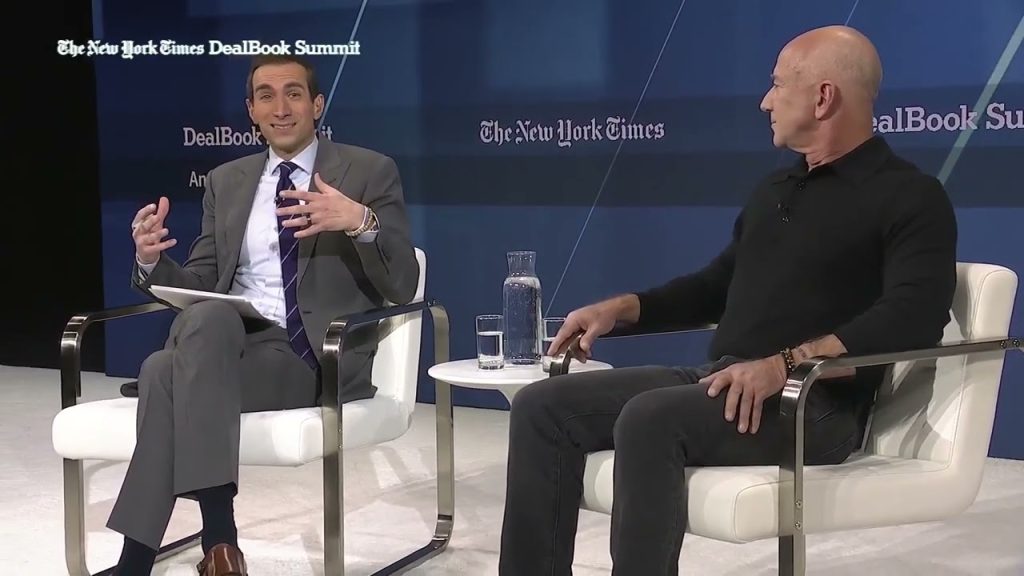Summarize this content to 2000 words in 6 paragraphs
Amazon founder Jeff Bezos said he was “very optimistic” about President-elect Donald Trump’s return to office, saying that he thinks Trump is “calmer” and “more confident and more settled” this time around.
In a rare and lengthy interview Wednesday at The New York Times’ DealBook Summit, Bezos discussed a variety subjects, including his desire to work with Trump, his competition with Elon Musk, how hard he still works at Amazon, recent headline-making decisions at The Washington Post, big aspirations for his Blue Origin space venture, and more.
Eight years after Trump first took office — for a term in which he regularly went after Bezos and his companies — Bezos said he was “very hopeful” and that he thinks Trump has a good chance of succeeding.
“He seems to have a lot of energy around reducing regulation,” Bezos said of Trump. “If I can help him do that, I’m going to help because we do have too much regulation in this country.”
Pressed by Andrew Ross Sorkin of the Times about that view — and that Trump believes such things as the press is the enemy of the people — Bezos said, “You’ve probably grown in the last eight years. He has, too.”
Keep reading for more highlights from the interview:
Jeff Bezos, right, during a conversation with Andrew Ross Sorkin of The New York Times at the DealBook Summit on Wednesday. (Screenshot via New York Times on YouTube)
Blue Origin: A noted space geek since he was a little boy, Bezos was especially out there when discussing space flight, and he was extra bullish about the prospects for Kent, Wash.-based Blue Origin during the interview. “From a business point of view, from a financial returns point of view, I think it’s going to be the best business that I’ve ever been involved in,” Bezos said. “Bigger than Amazon?” Sorkin replied. “Yeah,” Bezos said — a big proclamation, given Amazon’s $2.3 trillion market capitalization. He went on to talk about how Blue Origin will fuel his fantastical vision for moving heavy industry off Earth and how working from the moon will help propel humans to the far reaches of the solar system.
Amazon: Three years after stepping down as CEO of the company he founded, Bezos, who is still executive chairman, said he’s never worked harder at the company. “This retirement thing, I’ve turned out to be extremely lame at,” he said. Asked by Sorkin what it was like to step away from his “baby,” Bezos said, “Even when Amazon was a tiny company, for whatever reason, I always had in my mind that I wanted to build a company that would outlast me.” Today, Bezos said his heart is still with the tech giant. “My curiosity is Amazon. My fears are there. My love is there. I’m never gonna forget about Amazon. I’ll always be there to help, and right now I’m putting a lot of time in it, because it’s also super interesting.”
Promise of AI: Bezos said 95% of what he’s working on Amazon right now is artificial intelligence. “We’re literally working on 1,000 applications internally,” he said, adding that he is excited and not scared of what AI will achieve. He also got in a plug for company announcements made this week at AWS re:Invent, including for a new set of AI foundation models called “Nova.”
Washington Post: Bezos said he is proud of the decision he made just before the election to end presidential endorsements at the Post, the newspaper he has owned since 2013. “It was far from cowardly,” he said in response to criticism he received at the time from former editor Marty Baron. He repeated points he made in a later Post column explaining the move, in which he said his many conflicts of interest make him not an ideal newspaper owner. “What I do bring to the Post, when they need financial resources I’m available,” he said to laughter on Wednesday.
Elon Musk: Bezos and Musk have sparred repeatedly over the years on social media, but Bezos took a more civil approach Wednesday, calling Musk and SpaceX “very able competitors.” He said he takes what Musk has said at face value when it comes to Trump’s close tech ally not using his newfound political power to gain advantage for his own companies or to disadvantage his competitors. “I could be wrong about that, but I think it could be true,” Bezos said.
Public perception: Asked about the difference between the perceived Jeff Bezos and the real Jeff Bezos, the world’s second richest person said he “gave up on being well understood a long time ago.” Rather than landing on a list of billionaires, Bezos said he’d rather be on a list of people who created wealth for others. Or better yet, Bezos said, “I really am an inventor. I’m very good at that.” The answer is reminiscent of a 2011 shareholder meeting where he discussed innovation and a willingness at Amazon to be misunderstood. “I love having a team of other smart people, and we work together, and we find unusual solutions to things, and that’s how I think of myself,” Bezos said Wednesday. “If I could somehow have a Forbes list of inventors, and if I could climb my way to the top of that list, then I’d be understood — or at least in part.”
In addition to Bezos, who was the headliner of the DealBook Summit, the event also featured Google CEO Sundar Pichai; OpenAI CEO Sam Altman; Federal Reserve Chairman Jerome Powell; former President Bill Clinton; Prince Harry, tennis star Serena Williams; “Call Her Daddy” podcaster Alex Cooper; and others.


